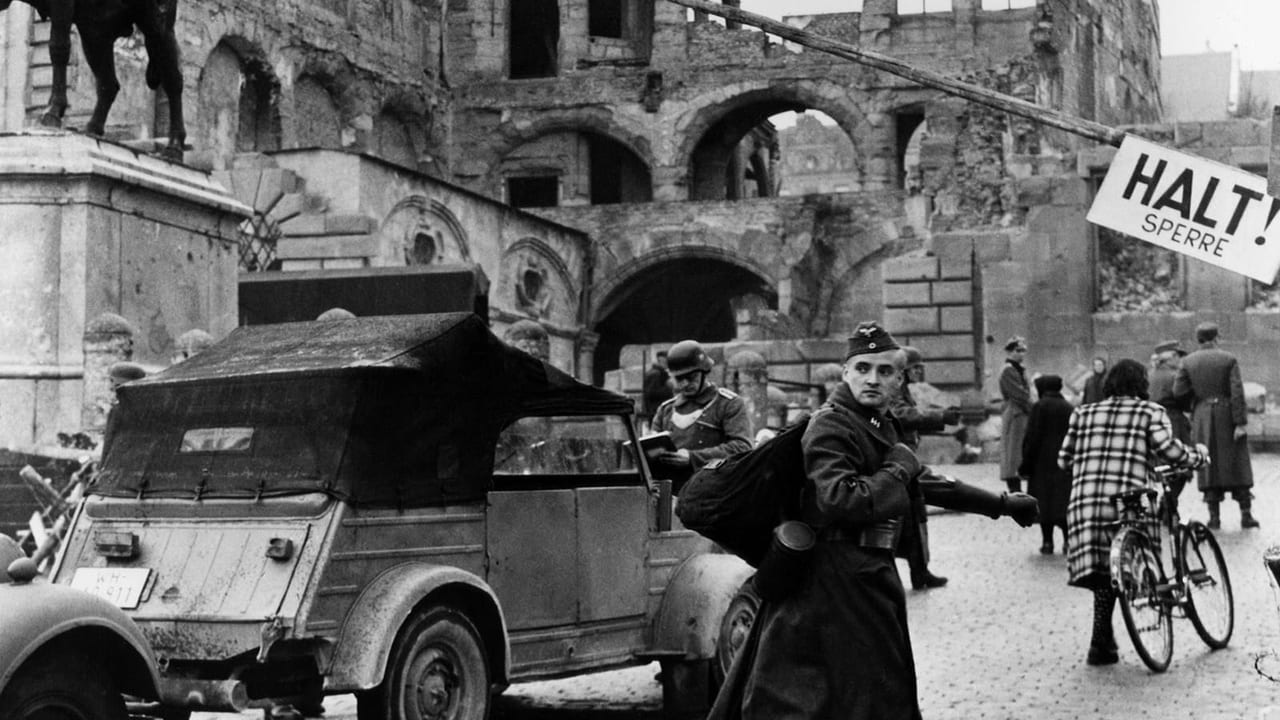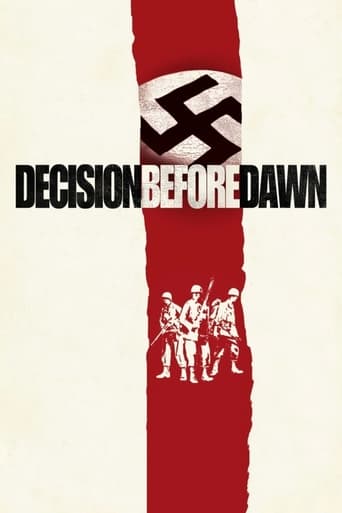



An Exercise In Nonsense
Fun premise, good actors, bad writing. This film seemed to have potential at the beginning but it quickly devolves into a trite action film. Ultimately it's very boring.
View Morea film so unique, intoxicating and bizarre that it not only demands another viewing, but is also forgivable as a satirical comedy where the jokes eventually take the back seat.
View MoreIf you like to be scared, if you like to laugh, and if you like to learn a thing or two at the movies, this absolutely cannot be missed.
View MoreSpoiler alert. While searching youtube for flix, I came across Richard basehart's voice, narrating an execution. And the camera was extremely mobile. Basehart, riding in a jeep comes across two Germans, one is Oscar werner, who I recognize, but his name eludes me. I thought of tin drum but did not do Oskar oskar. So Merrill the tough no nonsense commander lets Basehart know that recruiting German spies from the pow's is the game plan and werner volunteers. Seems to be a propaganda film asserting that the Germans are just scared and some good some bad, in 51 the alliance with west Germany needed to be sold and the earnest youngster Oskar werner was the salesman. Most poignant moments when he is recognized by a lady on a tram, who calls him by his real name and tells him where his father is now working. He calls his father, but only hears his voice like a crank caller and then he hangs up. His heart is pure and his disloyalty to his father troubles him. Basehart and the other traitor who is in it for the money are very believable, yet certainly unplumbed. It is Oskar and his comfort and discomfort with Germans- a soldier on a train, a dance hall girl, a gestapo agent, a general who needs a syringe of medicine to survive, a little boy who gets too scared to finger Basehart in a bombed out building at a fateful moment. Movie gave impression that Germany in 1950 was still in ruins.
View MoreThis is one of Fox's semi-documentaries, complete with the usual Foreword informing us about real people (only their names have been changed) caught up in real events. Aside from the German players – Hans Christian Blech is excellent as usual and so is O.E. Hasse – speaking English to each other, the movie is grimly realistic. Although no expense has been spared, tension does tend to be dissipated by the movie's long running time and thus lose some of its initial promise and impetus. The movie is more a picaresque study of Oskar Werner's adventures through war-torn Germany in 1944 than the suspenseful spy yarn initially promised, although it still carries plenty of excitement. Perhaps Werner's hero is too youthfully deferential to excite full audience identification. We usually like our main character to be made of stronger stuff like Richard Basehart and Gary Merrill. In fact, although first-billed, Basehart disappears from the action for far too long, It's too lengthy a hiatus before he finally reappears in time for the chase climax. Nevertheless, there are scenes that jolt the eye and ear along the way, along with thousands of extras. And it's all brought to life unobtrusively yet masterfully by director by Anatole Litvak, and superbly photographed by Franz Planer.
View MorePeople remember Oskar Werner for his role in Fahrenheit 451, but this was his best role in one of the best WWII films in history. The sets are spectacular and would be impossible to recreate today. Richard Basehart, typically a ham, was excellent. There were some really great WWII films, like The Train, The Two Headed Spy, Bridge on the River Kwai and Stalag 17. This one was nominated for Best Picture 1951, and truly deserved it! Toward the end of the war, Nazi Germany was struggling with a collapsed economy, broken infrastructure and a deeply damaged and demoralized population. Both sides used underhanded and conniving methods to win the war, and this true story shows just how far they were willing to go. This is a very well made movie, which was an effort to make in 1951, and would be impossible to make today.
View MoreThis film was nominated for best picture in 1951 and along with "A Place in the Sun," should have received more careful attention from Academy voters. Their choice of "An American in Paris" as best picture left a bitter taste in the mouths of movie people."Decision Before Dawn" chronicles the U.S. army's attempt to recruit German soldiers to spy on their own countries. These recruits are tested at a prisoner of war camp.A very young Oskar Werner steals the show as one who is chosen. The picture becomes even more exciting as Werner eludes the German army as the gestapo is on to him. This film deals with those Germans who realized that the war was lost and what Germany had done, they want to redeem themselves even if it means that their countrymen would denounce them after the war. Then, there are those who would use this as an attempt to get back home and inform the army of the traitors among them.Werner gets terrific support from Gary Merrill and Richard Basehart, the latter a fantastically under-rated actor.
View More